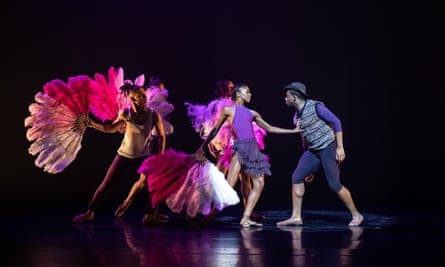[ad_1]
Lenny Henry: We need radical empathy, not racial sympathy

Over the years I have argued for a number of policies to increase racial equality in the media, from diversity tax breaks to ringfenced funds for marginalised production companies. I’ve even helped set up a centre for media diversity at Birmingham City University to not only research but also to advocate for better policies. Simply put: there is no silver bullet when it comes to racial equality. But at the core of everything we’re fighting for is the need to better understand each other and our different perspectives and values. We must get past simple “racial sympathy” – just feeling sorry for the victims of racism – and move towards “radical empathy”. Putting yourself in the shoes of someone who isn’t like you and trying to experience what they are going through is perhaps the answer to this age-old question.
-
Lenny Henry is an actor, writer and producer
Kojo Koram: Rethink Britain’s war on drugs

The easiest change we could make to undermine structural racism would be to change our drug laws. The current system of criminalising drug possession and supply has become a conveyor belt that feeds young Black people into our criminal justice system. It starts with stop and search. Drugs are the most common reason that police use to justify stopping and searching people; Black people are stopped at more than eight times the rate of white people. A fifth of all arrests of Black people result from stop and search, over three times the proportion for white people. Black people are then more likely to be prosecuted if arrested, be convicted if prosecuted, and be imprisoned if convicted of drug crimes.
Our archaic drug laws turn an innocuous stroll down the street for Black people into a lifetime criminal record, limiting employment and travel opportunities. As the rest of the world starts to recognise that drug prohibition is a motor for racial inequality, so must Britain.
-
Dr Kojo Koram teaches at the School of Law at Birkbeck, University of London
Lola Okolosie: Change the school curriculum in England

In English schools, the stories and contributions of black people have either been erased or reduced to a history of capture and conquest. For our education to be truly equitable, we need our government to follow the lead of its Welsh counterpart and mandate that the English curriculum be diversified to reflect and incorporate the experiences of black and minority communities. Until it does so, black children remain at the mercy of an insidious feedback loop. Overworked teachers exercise the freedom to treat black history and innovation as a marginal concern, an area to be covered briefly, if at all, once a year. Our young people shouldn’t be made to submit to this unequal status quo; it does them a disservice.
-
Lola Okolosie is an English teacher and writer focusing on race, politics, education and feminism

Diane Abbott: Make our politics anti-racist

Britain has its first ever prime minister of colour. Rishi Sunak’s ascent to the top position in British politics is noteworthy. It’s something that many of us did not expect to see in our lifetimes. But when it comes to race equality and politics, representation is only part of the equation. More important is whether the political system is prepared to acknowledge institutional racism and do something about it. We will see. Sunak has never demonstrated even a flicker of interest in race or equality. And the austerity he desires will impact black and brown Britons harder than anyone else. While representation matters, what matters even more is having a political leader who is willing to acknowledge the existence of institutional racism and root it out.
-
Diane Abbott is Labour MP for Hackney North and Stoke Newington
Travis Alabanza: Encourage Black creatives

Black equality will never be achieved while we insist on carving up identity into neat little boxes. You cannot separate the Black lived experience in the UK from the decimation of the NHS, our bottomed-out social housing offering and the gaping holes in our welfare safety net. In theatre, I want to see more Black creatives given the opportunity to create in a way that is not limited to what could be viewed as “Black work”. Black creatives need more funding, support and trust, both on stage and behind the scenes, to exist in all our different shapes and forms.
-
Travis Alabanza is a writer, performer and theatre-maker
Franklyn Addo: Treat children as children, not suspects

Working with vulnerable young people in London, I witness first-hand the disruptive and disturbing impact of heavy-handed policing. I hear from black children what it is like to be routinely treated as suspects by teachers or police officers. Black people in Britain continue to endure negative outcomes across health, education and criminal justice: we’re inadequately treated for illnesses such as Alzheimer’s disease and sickle cell anaemia; disproportionately excluded from school; shot dead by police officers while unarmed. Our experiences are too often ridiculed or vilified, but in the face of gaslighting we must continue to speak up, and hold the lawmakers who sustain these present realities to account.
-
Franklyn Addo is an artist and youth worker
Victor Adebowale: Black history is history – teach it all year round

The main thing we need to do is recognise racism as a systemic challenge in society, one requiring a variety of things to move the needle towards equity and equality. I would start with these. We need black history taught as history not just once a year, and not just as black history. We need economic education to engage citizens in the reality of our market economy. And there must be accountability in public leadership. It must truly be a matter of leading all the people all the time, not some of the people some of the time.
-
Victor Adebowale is former chief executive of the social care enterprise Turning Point, current chair of the NHS Confederation and a people’s peer in the House of Lords
Michelle Kambasha: Make space for black Britons in the arts industry

The whitewashing of historically black arts spaces has been slow and progressive; 1980s house clubs that were once almost exclusively black are now dominated by white punters – and you would be forgiven for thinking that black ballet dancers or playwrights or theatre performers never existed at all. Those mainstream musicians who do hit the big time despite battling structural racism are often, and rightfully, exalted. But we must not forget underground pioneers from across the Atlantic like dancer Alvin Ailey, playwright August Wilson and DJ Lady D. By honouring the trailblazers of our arts and culture industries, we forge tighter connections with our diverse artistic history and are reminded that black people can never truly be excluded from spaces that we have been instrumental in building.
-
Michelle Kambasha works in the music industry

Annabel Sowemimo: An end to pernicious race science

Race science is an enduring and pernicious myth at the heart of medicine that must be confronted. The idea that black people suffer from defective biology, feeding much of the racism we experience; the myth that our skin colour makes us intellectually inferior and that those who do succeed academically are a rare breed; the notion that black people are better suited to physical jobs, despite proven evidence that environmental factors influence our social outcomes.
This dangerous rhetoric must be starved of oxygen, and weeded out from our early education, healthcare and language. To decolonise our medical institutions, we must first reckon with how these ideas took hold, and their enduring role in the oppression of black communities today.
-
Dr Annabel Sowemimo is a doctor, activist and writer, and founder of community-based organisation Decolonising Contraception
Yomi Sode: A new chapter for black Britons in publishing

In the publishing industry, I want to see more black people appointed in editing roles, and appropriately rewarded for their work. There is a troubling lack of black faces in senior positions, and too often, juniors are exploited for their ideas by senior executives who have no knowledge of our communities or cultures. Even in recent conversations, I know people who have met their targets, brought awards home for their publishing house, and are still overlooked. Black creatives still lack the opportunity to climb the ladder while lesser-skilled people profit from their talents.
-
Yomi Sode is an award-winning Nigerian-British writer. His debut poetry collection, Manorism, is published by Penguin
Muyiwa Oki: Make Britain’s buildings reflect our diverse communities

Given my Nigerian heritage, the UK’s colonial history is deeply personal to me. Look around our cities and its ongoing legacy can be felt in every aspect of urban design, from street names to the materials of the buildings we occupy. To drive forward Black equality in the UK, we need to reckon with these hard truths, and take steps to foreground the voices of those who have historically been ignored. We need to invest time and resources into ensuring people from Black communities have the tools to enter and succeed in the built environment sector. To create a future where all communities can thrive, we must be representative of the society we serve.
-
Muyiwa Oki is president-elect of the Royal Institute of British Architects
Abimbola Johnson: Let’s radically transform our punitive institutions

Black communities are on the receiving end of the worst discrimination in many areas of society, but we are not a monolith. My “one change” would be to see a multifaceted approach to Black equality, with solutions as complex as we are. Solutions that don’t work in silos, or ask us to assimilate. Solutions that radically transform and reconfigure institutions. We need to prioritise welfare over punitive action and to move away from labels that stick with people and isolate them for life. I want to see concerted and coordinated reform of the justice and penal systems, education, housing, employment, immigration, welfare, and physical and mental health provision.
-
Abimbola Johnson is a barrister at Doughty Street Chambers and chair of the Independent Scrutiny and Oversight Board for the police’s National Race Action Plan
Athena Kugblenu: Allow Black people to be mediocre too!

I would like to replace #blackexcellence with #blackmediocrity. True equality is when our talent:recognition ratio is allowed to be as broad as white people’s. Lewis Hamilton had to win two Formula One titles before he bagged BBC Sports Personality of the Year in 2014; Greg Rusedski only had to get battered by Pat Rafter to win his. Kwasi Kwarteng steered the economy towards an iceberg and got sacked. Jeremy Hunt drove the NHS over a cliff, now he’s chancellor. Don’t get me started on how many football clubs get ruined by freshly retired white footballers while very qualified Black managers are overlooked. When the arc of the moral universe bends towards Black people failing upwards as their peers do, we will be in the promised land.
-
Athena Kugblenu is a comedian and writer

Sussie Anie: Celebrate ordinary Black lives in books and films

I would like to see changes in our education systems. Discrimination within schools, when staff fail to see the tenderness, the humanity of Black children can have long-lasting consequences. It can close off opportunities in a space that should be opening worlds. Systemic issues require systemic change, not just in individuals or legislation, but in wider narratives that influence us all. I would like to see more stories in film and publishing that celebrate ordinary Black lives and centre joy and curiosity – stories that reflect the fundamental reality that Black people are equal.
-
Sussie Anie’s debut novel, To Fill a Yellow House, is out now
Ruth Honegan: Respond, finally, to issues raised by race reports

Over the course of nearly 20 years in policing, I have seen collective amnesia and ignorance leading to the repetition of past behaviours. Scarman, Macpherson, Lammy – they have all given their names to reviews into policing and the criminal justice system. They sit alongside the Runnymede report into disparities in the education system and several reports on racial disparities in healthcare. They all echo similar findings, highlighting the kinds of issues that ethnically diverse communities have been trying, in vain, to convey for years.
To move the dial for black equality, there must be a collective acknowledgement that our thoughts, beliefs and behaviour are influenced by the social construct of race, which perpetuates the myth that lighter skin denotes superiority and a right to fair treatment. Everyone must challenge the status quo through open conversation and by denouncing these apparent truisms.
-
Ruth Honegan is a police sergeant and deputy secretary of the National Black Police Association
Gus John: Confront the ‘Rule Britannia’ image of Britishness

After 58 years of struggle in this country, taking into account my experience of how race and racism is cynically exploited by the state and its institutions, I believe much flows from the failure of Britain to acknowledge the need for repair – especially to white Britain’s image of itself (“Rule Britannia” and all that).At the centre of the policy agenda, however, must be righting racial wrongs, from the hostile environment to the “school-to-prison” pipeline. No number of black faces in any cabinet, whatever the party and however much they embody the optics of diversity, will change that.
-
Prof Gus John is an academic and an equality and human rights campaigner
Alice Dearing: I want to see Black people dive in to swimming

I want to see the discriminatory barriers that prevent people from taking part in opportunities in life broken down and washed away. Swimming has sadly been plagued by racist stereotypes and issues of accessibility, which have caused so many black people to never set foot in the water and take the first steps in learning to swim.
I want that to change. I want to see everyone, no matter their race or background, have the opportunity to swim and know that it is something they are capable of. I helped co-found the Black Swimming Association (BSA) to do just that – we’re trying to make sure that, in swimming, equality becomes a reality for everyone.
-
Alice Dearing is a swimmer who represented Great Britain at the Tokyo Olympics

-
Do you have an opinion on the issues raised in this article? If you would like to submit a response of up to 300 words by email to be considered for publication in our letters section, please click here.
[ad_2]
Meet Our Successful Graduates: Learn how our courses have propelled graduates into rewarding
careers. Explore their success stories here!
Discover More About Your Future: Interested in advancing your teaching career? Explore our
IPGCE, MA, and QTS courses today!

Explore Our Courses: Ready to take the next
step in your education journey? View our
comprehensive course offerings now!
